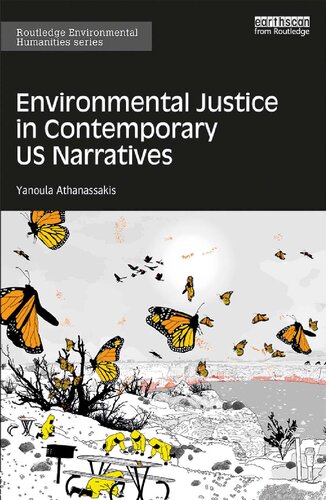Product desciption
Environmental Justice In Contemporary Us Narratives Athanassakis by Athanassakis, Yanoula; 9781138890398, 9781315712444, 1138890391, 131571244X instant download after payment.
Environmental Justice in Contemporary US Narratives examines post-1929 US artistic interrogations of environmental disruption. Tracing themes of pollution, marine life, and agricultural production in the work of a number of historically significant writers including John Steinbeck, Ruth Ozeki, and Cherríe Moraga, this book outlines a series of incisive dialogues on transnational flows of capital and environmental justice. Texts ranging from The Grapes of Wrath (1939) to Body Toxic (2001) represent the body as vulnerable to a host of environmental risks. They identify "natural disasters" not just as environmental hazards and catastrophes, but also as events intertwined with socioeconomic issues.
With careful textual analysis, Athanassakis shows how twentieth- and twenty-first-century US writers have sought to rethink traditional understandings of how the human being relates to ecological phenomena. Their work, and this study, offer new modes of creative engagement with environmental degradation – engagement that is proactive, ambivalent, and even playful.
This book contributes to vital discussions about the importance of literature for social justice movements, food studies, ecocriticism, and the environmental humanities. The core argument of the book is that artistically imaginative narratives of environmental disturbance can help humans contend with ostensibly uncontrollable, drastic planetary changes.
Review
Athanassakis expands our understanding of environmental justice through her brilliant engagements with the power of imaginative witnessing, social movements, and biological citizenship. Her book creates essential bridgework between issues as wide-ranging as immigration, industrial agriculture, not-so-natural disasters, and cellular mutation. This ambitious, persuasive work will have a transformative impact across a range of fields, including the environmental humanities, transnational American studies, gender and ethnic studies, immigrant studies, food studies, trauma studies, biopolitics, and animal studies.
Rob Nixon, author of Slow Violence and the Environmentalism of the Poor
Environmental Justice in Contemporary US Narratives dives into the lively, sometimes contentious debates surrounding ecocriticism, American studies, and media studies to make sense of their entangled intellectual roots. From John Steinbeck to Karen Tei Yamashita, Athanassakis brilliantly reads environmental justice fictions about food production, laboring bodies, citizenship and globalization, for what they tell us about ecological destruction inherent in rampant – markedly American – global capitalism. The result is a richly satisfying, and much needed, recalibration of our understanding of the major contributions of transnational American Studies to the fast rising field of the environmental humanities."
Joni Adamson, Professor, Environmental Humanities, and Director of the Environmental Humanities Initiative, Arizona State University, USA
About the Author
Yanoula Athanassakis received her PhD in English (American Literature), with a global studies emphasis, from the University of California at Santa Barbara, USA. She is Co-Founder of the Environmental Humanities Series at New York University (NYU) and Assistant Vice Provost for Academic Affairs, NYU, USA.


